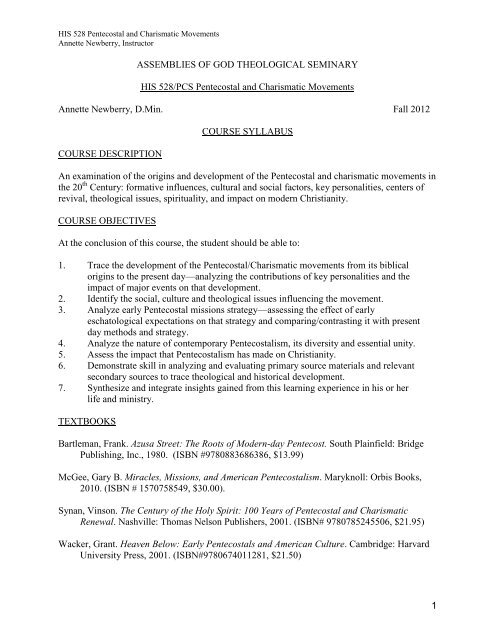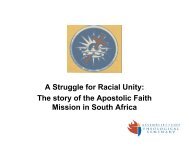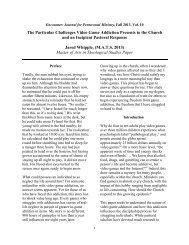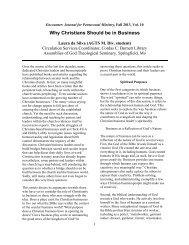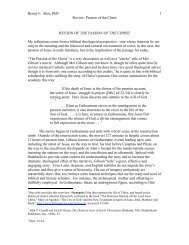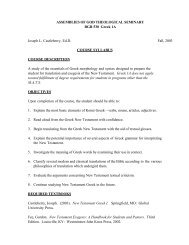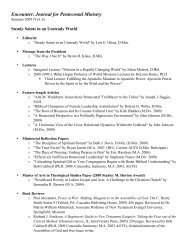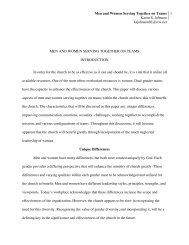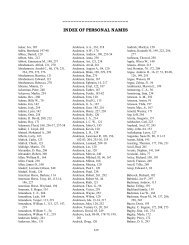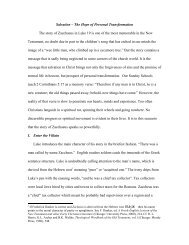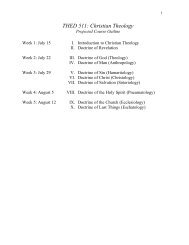Syllabus - Assemblies of God Theological Seminary
Syllabus - Assemblies of God Theological Seminary
Syllabus - Assemblies of God Theological Seminary
You also want an ePaper? Increase the reach of your titles
YUMPU automatically turns print PDFs into web optimized ePapers that Google loves.
HIS 528 Pentecostal and Charismatic Movements<br />
Annette Newberry, Instructor<br />
ASSEMBLIES OF GOD THEOLOGICAL SEMINARY<br />
HIS 528/PCS Pentecostal and Charismatic Movements<br />
Annette Newberry, D.Min. Fall 2012<br />
COURSE DESCRIPTION<br />
COURSE SYLLABUS<br />
An examination <strong>of</strong> the origins and development <strong>of</strong> the Pentecostal and charismatic movements in<br />
the 20 th Century: formative influences, cultural and social factors, key personalities, centers <strong>of</strong><br />
revival, theological issues, spirituality, and impact on modern Christianity.<br />
COURSE OBJECTIVES<br />
At the conclusion <strong>of</strong> this course, the student should be able to:<br />
1. Trace the development <strong>of</strong> the Pentecostal/Charismatic movements from its biblical<br />
origins to the present day—analyzing the contributions <strong>of</strong> key personalities and the<br />
impact <strong>of</strong> major events on that development.<br />
2. Identify the social, culture and theological issues influencing the movement.<br />
3. Analyze early Pentecostal missions strategy—assessing the effect <strong>of</strong> early<br />
eschatological expectations on that strategy and comparing/contrasting it with present<br />
day methods and strategy.<br />
4. Analyze the nature <strong>of</strong> contemporary Pentecostalism, its diversity and essential unity.<br />
5. Assess the impact that Pentecostalism has made on Christianity.<br />
6. Demonstrate skill in analyzing and evaluating primary source materials and relevant<br />
secondary sources to trace theological and historical development.<br />
7. Synthesize and integrate insights gained from this learning experience in his or her<br />
life and ministry.<br />
TEXTBOOKS<br />
Bartleman, Frank. Azusa Street: The Roots <strong>of</strong> Modern-day Pentecost. South Plainfield: Bridge<br />
Publishing, Inc., 1980. (ISBN #9780883686386, $13.99)<br />
McGee, Gary B. Miracles, Missions, and American Pentecostalism. Maryknoll: Orbis Books,<br />
2010. (ISBN # 1570758549, $30.00).<br />
Synan, Vinson. The Century <strong>of</strong> the Holy Spirit: 100 Years <strong>of</strong> Pentecostal and Charismatic<br />
Renewal. Nashville: Thomas Nelson Publishers, 2001. (ISBN# 9780785245506, $21.95)<br />
Wacker, Grant. Heaven Below: Early Pentecostals and American Culture. Cambridge: Harvard<br />
University Press, 2001. (ISBN#9780674011281, $21.50)<br />
1
HIS 528 Pentecostal and Charismatic Movements<br />
Annette Newberry, Instructor<br />
METHODOLOGY<br />
The teaching/learning process will include lectures, PowerPoint presentations, class discussions<br />
and interaction, student presentations, small groups, media presentations, reading and writing<br />
activities, and guest speakers.<br />
COURSE REQUIREMENTS<br />
1. Attendance. Regular punctual attendance and participation in classroom activities are<br />
required. Absences must not exceed the number permitted in the seminary catalog if<br />
credit is to be given for the course. More than two absences will affect the final grade.<br />
2. Textbooks. Careful and thoughtful reading <strong>of</strong> all the required textbooks and assigned<br />
readings is necessary in order to participate in class/small group discussions and prepare<br />
for examinations.<br />
3. Assignments: The following assignments are to be completed for this course:<br />
A. Pre-session:<br />
a. A concise three page book critique <strong>of</strong> Azusa Street: The Roots <strong>of</strong> Modern-day<br />
Pentecost by Frank Bartleman (Due: First day <strong>of</strong> class).<br />
b. A concise five page book critique <strong>of</strong> Miracles, Missions, and American<br />
Pentecostalism by Gary B. McGee.(Due: First day <strong>of</strong> class). See information<br />
about Book Critiques posted on the portal.<br />
B. Post-Sesssion:<br />
C. A three page pr<strong>of</strong>ile <strong>of</strong> early Pentecostals and their characteristics from the book:<br />
Heaven Below by Grant Wacker (Due: two weeks after the module; exact date to<br />
be announced).<br />
D. One final exam over will be given for the course (Due: week <strong>of</strong> final exams; exact<br />
date to be announced).<br />
E. Research Paper or Creative Project: A research paper or creative project written<br />
mainly from primary source materials on a subject related to Pentecostal and<br />
Charismatic history. This project may be in the form <strong>of</strong> a 15-18 page research<br />
paper, a series <strong>of</strong> teaching notes with PowerPoint presentation, an interview, a<br />
video presentation or other approved projects. Suggested subjects and details <strong>of</strong><br />
this project will be discussed during the first class session (Due: two weeks before<br />
end <strong>of</strong> semester; exact date to be announced).<br />
All written materials presented to the instructor should be in correct Turabian<br />
formatting, double-spaced, using 12-point Times New Roman font with one-inch<br />
margins and left margin justification only. Each paper should contain the<br />
following information in a header, or in the case <strong>of</strong> longer projects and papers, a<br />
formal cover sheet containing the following information. The same information<br />
must be included for any assignments presented electronically and the file name<br />
should be identifiable (author’s name and title <strong>of</strong> paper; Example:<br />
jjones paper1.doc).<br />
2
HIS 528 Pentecostal and Charismatic Movements<br />
Annette Newberry, Instructor<br />
1. Name <strong>of</strong> student<br />
2. Name and number <strong>of</strong> the course<br />
3. Title <strong>of</strong> the paper<br />
4. Student’s box number at AGTS<br />
5. Date<br />
4. Flower Pentecostal Heritage Center: To facilitate doing research with primary source<br />
materials, each student should sign up as a member <strong>of</strong> the Flower Pentecostal Heritage<br />
Center before the first day <strong>of</strong> class (Free online at www.ifphc.org).<br />
5. Spiritual Formation. Spiritual Formation is an integral part <strong>of</strong> your seminary<br />
experience. Each class will begin with a short devotional and prayer time. Students will<br />
have the chance to worship together in any AGTS chapel scheduled during the module.<br />
COURSE OUTLINE<br />
I. Introduction to the Course<br />
II. Charismatic Movements up to 1900's<br />
III. Charles Parham and Early Leaders<br />
IV. Azusa Street and Other Early Revivals<br />
V. Early Controversies and Doctrinal Differences<br />
VI. Formation <strong>of</strong> Pentecostal Organizations and Church Groups<br />
V. Missions and Missionary Focus<br />
VI. Salvation and Healing Revivals<br />
VII. Charismatic and Catholic Charismatic Renewals<br />
VIII. Televangelist “Superstars”<br />
IX. Modern Revivals<br />
X. The Future <strong>of</strong> Pentecostalism<br />
COURSE CALENDAR: (TBA)<br />
GRADING PROCEDURE<br />
Final Exam 30%<br />
Textbook Comparisons and papers 30%<br />
Research Project 40%<br />
All papers and creative projects will be evaluated in the following manner according to the<br />
correct use <strong>of</strong> research methods, the relevancy <strong>of</strong> the sources, clear and logical presentation, and<br />
originally <strong>of</strong> the work.<br />
1. 20% for general presentation (Correct Turabian formatting; grammar, spelling, etc.)<br />
2. 10% for the thesis statement and introduction<br />
3. 10% for quality <strong>of</strong> reason<br />
4. 50% <strong>of</strong> content (use <strong>of</strong> primary sources, originality, etc)<br />
5. 10% for conclusion<br />
3
HIS 528 Pentecostal and Charismatic Movements<br />
Annette Newberry, Instructor<br />
AGTS Grading Scale:<br />
CAUTIONS:<br />
Publishable = A+<br />
100% - 94% = A<br />
93% - 90% = A-<br />
89% - 87% = B+<br />
86% - 84% = B<br />
83% - 80% = B-<br />
79% - 77% = C+<br />
76% - 74% = C<br />
73% - 70% = D+<br />
69% - 67% = D<br />
66% - 64% = D-<br />
1. It is expected that all work will be completed as scheduled. Late work is subject to<br />
penalty. All assigned work must be presented to the teacher before a semester grade can<br />
be issued. Failure to turn in all assigned work will result in an F.<br />
2. A grade <strong>of</strong> incomplete will be given only in the event <strong>of</strong> extreme circumstances.<br />
3. Students are requested to refrain from computer games, email, social networking, or other<br />
unassigned internet activities during class sessions.<br />
4. Please turn <strong>of</strong>f cell phones before the beginning <strong>of</strong> class. Leaving class to answer a call<br />
disrupts the class and distracts from your classroom participation. Arrangements for your<br />
personal communication need to be made before or after class and not during class.<br />
5. Plagiarism is grounds for a grade <strong>of</strong> F. The student will be referred to the Dean for further<br />
disciplinary action.<br />
ACADEMIC INTEGRITY<br />
It is assumed that students at AGTS will endeavor to be honest and <strong>of</strong> high integrity in all<br />
matters pertaining to <strong>Seminary</strong> life. A lack <strong>of</strong> respect and integrity is evidenced by cheating,<br />
fabricating, plagiarizing, misusing facilities, removing books and other property not one’s own,<br />
and disrupting classes.<br />
Cheating is defined as “intentionally using or attempting to use unauthorized materials,<br />
information or study aids in any academic exercise.” It is assumed that whatever is<br />
submitted by a student is the work <strong>of</strong> that student and is new work for that course. Fabrication is<br />
“intentional and unauthorized falsification or invention <strong>of</strong> any information or citation in an<br />
academic exercise or form.” Plagiarism is “intentionally or knowingly representing the words or<br />
ideas <strong>of</strong> another as one’s own in any academic exercise.” One who facilitates any <strong>of</strong> the above is<br />
equally responsible with the primary violator.<br />
Penalties may include restitution, an “F” on an individual paper, exam, or course; loss <strong>of</strong><br />
campus employment; disciplinary probation; removal from extracurricular activities; and<br />
suspension.—AGTS Student Handbook<br />
4
HIS 528 Pentecostal and Charismatic Movements<br />
Annette Newberry, Instructor<br />
BIBLIOGRAPHY:<br />
The Azusa Street Papers. Foley, Ala.: Harvest Publications, 1997. (Includes a reprint <strong>of</strong><br />
the issues <strong>of</strong> the Los Angeles Apostolic Faith, 1906–1908.)<br />
Burgess, Stanley M., Ed. New International Dictionary <strong>of</strong> Pentecostal and Charismatic<br />
Movements. Grand Rapids: Zondervan Publishing House, 2002.<br />
De Leon, Victor. The Silent Pentecostals: A Biographical History <strong>of</strong> the Pentecostal Movement<br />
Among Hispanics in the Twentieth Century. Taylors, S.C.: Faith Printing Co., 1979.<br />
Dempster, Murray W., Byron D. Klaus, Douglas Petersen, eds. Called & Empowered: Global<br />
Mission in Pentecostal Perspective. Peabody, Mass.: Hendrickson Publishers, 1991.<br />
Donaldson, Hal, and Joel Kilpatrick. “Inside the Los Angeles Dream Center.” Pentecostal<br />
Evangel (28 November 1999): 8–11.<br />
Du Plessis, David J. The Spirit Bade Me Go. Rev. ed. Plainfield, N.J.: Logos International, 1970.<br />
G<strong>of</strong>f, James R. Fields White Unto Harvest. Fayetteville, University <strong>of</strong> Arkansas Press, 1988.<br />
G<strong>of</strong>f, Jr., James R., and Grant Wacker, Eds. Portraits <strong>of</strong> a Generation: Early Pentecostal<br />
Leaders. Fayetteville: University <strong>of</strong> Arkansas Press, 2002.<br />
Gonzalez, Nino. Manteniendo Pentecostés Pentecostal: Hacia un Avivamiento Permanente.<br />
Miami: Editorial Vida, 1998.<br />
Harrell, David Edwin, Jr. All Things Are Possible: The Healing and Charismatic Revivals in<br />
Modern America. Bloomington, Indiana: University Press, 1975.<br />
Hoover, Willis Collins. History <strong>of</strong> the Pentecostal Revival in Chile. Translated by Mario G.<br />
Hoover. Lakeland, Fla.: By the translator, 2000.<br />
Jacobsen, Douglas. “Knowing the Doctrines <strong>of</strong> Pentecostals: The Scholastic Theology <strong>of</strong> the<br />
<strong>Assemblies</strong> <strong>of</strong> <strong>God</strong>, 1930–55.” In Pentecostal Currents in American Protestantism,<br />
edited by Edith L. Blumh<strong>of</strong>er, et al., 90–107. Urbana: University <strong>of</strong> Illinois Press, 1999.<br />
Nienkirchen, Charles W. A. B. Simpson and the Pentecostal Movement. Peabody, Mass.:<br />
Hendrickson, 1992.<br />
Warner, Wayne E. The Woman Evangelist: The Life and Times <strong>of</strong> Charismatic Evangelist Maria<br />
B. Woodworth-Etter. Metuchen: Scarecrow Press, 1986.<br />
5
HIS 528 Pentecostal and Charismatic Movements<br />
Annette Newberry, Instructor<br />
SPECIFIC DATA:<br />
Prepared by Annette Newberry<br />
March 20, 2012 (revised)<br />
Email Address: anewberry@agts.edu<br />
Office Phone: 417-268-1969<br />
6


